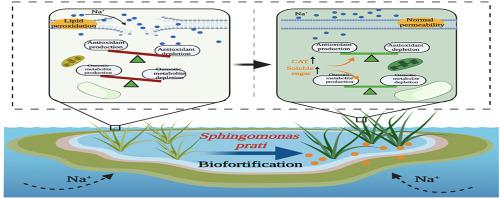当前位置:
X-MOL 学术
›
Environ. Pollut.
›
论文详情
Our official English website, www.x-mol.net, welcomes your
feedback! (Note: you will need to create a separate account there.)
Roles of endophytic bacteria in Suaeda salsa grown in coastal wetlands: Plant growth characteristics and salt tolerance mechanisms
Environmental Pollution ( IF 7.6 ) Pub Date : 2021-06-22 , DOI: 10.1016/j.envpol.2021.117641 Jiameng Guo 1 , Youyuan Chen 2 , Pengzhan Lu 1 , Ming Liu 1 , Ping Sun 1 , Zhiming Zhang 2
Environmental Pollution ( IF 7.6 ) Pub Date : 2021-06-22 , DOI: 10.1016/j.envpol.2021.117641 Jiameng Guo 1 , Youyuan Chen 2 , Pengzhan Lu 1 , Ming Liu 1 , Ping Sun 1 , Zhiming Zhang 2
Affiliation

|
Salinity is a limiting factor in the growth of plants in coastal wetlands. The interaction of halophytes with salt-tolerant endophytes has been one of the major concerns in this area. However, the mechanism by which endophytes promote halophyte growth remains unclear. The growth and physiological responses of inoculated with endophytic bacteria ( and ) at 0 ‰ and 20 ‰ NaCl were studied. The results showed that had stronger positive effects on the growth of under 0 ‰ NaCl, and performed better under 20 ‰ NaCl. inoculation increased the mean height, root length, fresh weight and dry weight by 45.43%, 9.91%, 82.00% and 102.25%, respectively, compared with the uninoculated treatment at 20 ‰ NaCl. inoculation decreased MDA content by 23.78%, while the soluble sugar and soluble protein contents increased by 15.08% and 12.57%, respectively, compared to the control, at 20 ‰ NaCl. Increases in SOD and CAT in the inoculation were 1.03 and 1.47-fold greater, respectively, than in the inoculation, under 20 ‰ NaCl. Moreover, and had antagonistic interactions in according to the results of the “interaction equation” (most G values were negative). PCA, clustering analysis and the PLS model revealed two mechanisms for regulating plant salt tolerance by which enhanced growth: (1) improved intracellular osmotic metabolism and (2) promoted the production of CAT in the antioxidant enzyme system and retained permeability. This study provides new insight into the comprehensive understanding and evaluation of endophytic bacteria as biological inoculants in plants under salt stress.
中文翻译:

沿海湿地碱蓬内生细菌的作用:植物生长特性和耐盐机制
盐度是沿海湿地植物生长的限制因素。盐生植物与耐盐内生菌的相互作用一直是该领域的主要关注点之一。然而,内生菌促进盐生植物生长的机制仍不清楚。研究了接种内生菌(和)在0%和20% NaCl条件下的生长和生理反应。结果表明,0% NaCl条件下对生长有较强的促进作用,20% NaCl条件下表现较好。与未接种20‰ NaCl处理相比,接种后平均高度、根长、鲜重和干重分别增加45.43%、9.91%、82.00%和102.25%。在20‰ NaCl条件下,接种后MDA含量较对照降低了23.78%,可溶性糖和可溶性蛋白含量分别比对照增加了15.08%和12.57%。在20‰ NaCl条件下,接种后SOD和CAT的增加分别是接种时的1.03和1.47倍。而且,根据“相互作用方程”的结果, 和 存在拮抗相互作用(大多数G值为负)。 PCA、聚类分析和PLS模型揭示了调节植物耐盐性从而促进生长的两种机制:(1)改善细胞内渗透代谢;(2)促进抗氧化酶系统中CAT的产生并保留渗透性。该研究为盐胁迫下植物内生细菌作为生物接种剂的全面理解和评价提供了新的见解。
更新日期:2021-06-22
中文翻译:

沿海湿地碱蓬内生细菌的作用:植物生长特性和耐盐机制
盐度是沿海湿地植物生长的限制因素。盐生植物与耐盐内生菌的相互作用一直是该领域的主要关注点之一。然而,内生菌促进盐生植物生长的机制仍不清楚。研究了接种内生菌(和)在0%和20% NaCl条件下的生长和生理反应。结果表明,0% NaCl条件下对生长有较强的促进作用,20% NaCl条件下表现较好。与未接种20‰ NaCl处理相比,接种后平均高度、根长、鲜重和干重分别增加45.43%、9.91%、82.00%和102.25%。在20‰ NaCl条件下,接种后MDA含量较对照降低了23.78%,可溶性糖和可溶性蛋白含量分别比对照增加了15.08%和12.57%。在20‰ NaCl条件下,接种后SOD和CAT的增加分别是接种时的1.03和1.47倍。而且,根据“相互作用方程”的结果, 和 存在拮抗相互作用(大多数G值为负)。 PCA、聚类分析和PLS模型揭示了调节植物耐盐性从而促进生长的两种机制:(1)改善细胞内渗透代谢;(2)促进抗氧化酶系统中CAT的产生并保留渗透性。该研究为盐胁迫下植物内生细菌作为生物接种剂的全面理解和评价提供了新的见解。









































 京公网安备 11010802027423号
京公网安备 11010802027423号